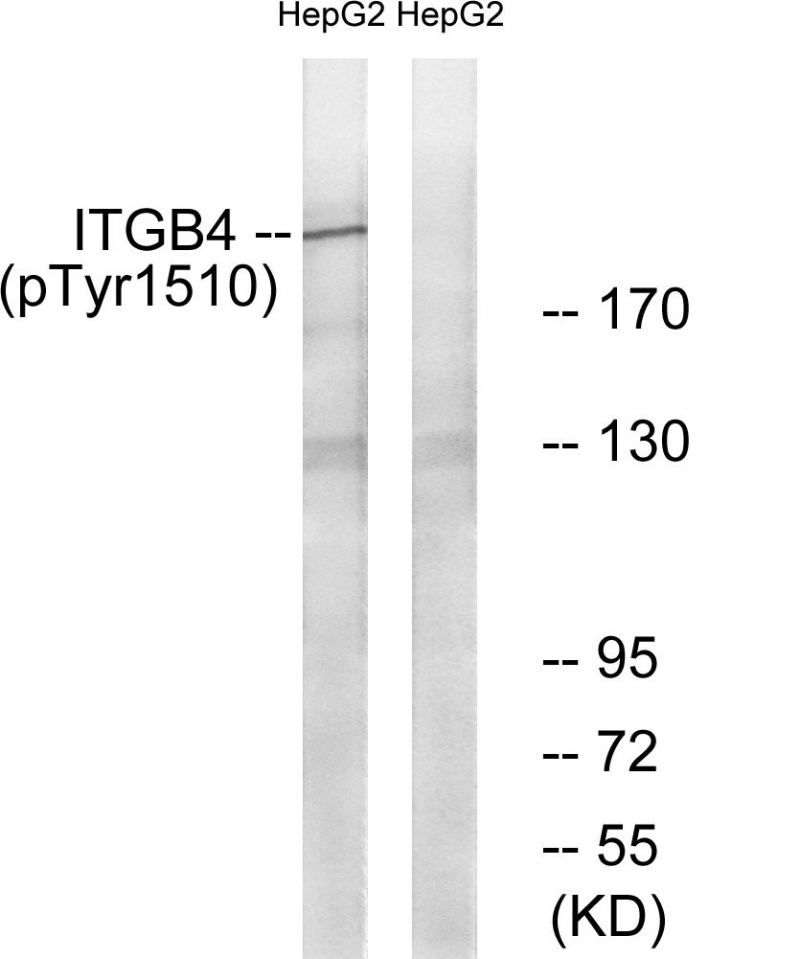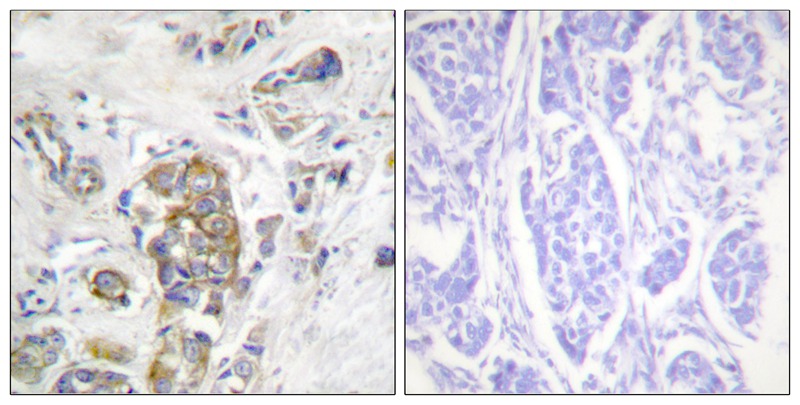

| WB | 咨询技术 | Human,Mouse,Rat |
| IF | 咨询技术 | Human,Mouse,Rat |
| IHC | 1/50-1/100 | Human,Mouse,Rat |
| ICC | 技术咨询 | Human,Mouse,Rat |
| FCM | 咨询技术 | Human,Mouse,Rat |
| Elisa | 咨询技术 | Human,Mouse,Rat |
| Aliases | GP150; ITB4; CD104 antigen; |
| Entrez GeneID | 3691; |
| WB Predicted band size | 202kDa |
| Host/Isotype | Rabbit IgG |
| Antibody Type | Primary antibody |
| Storage | Store at 4°C short term. Aliquot and store at -20°C long term. Avoid freeze/thaw cycles. |
| Species Reactivity | Human,Mouse,Rat |
| Immunogen | Peptide sequence around phosphorylation site of tyrosine1510(R-D-Y(p)-S-T) derived from Human ITGB4 . |
| Formulation | Purified antibody in PBS with 0.05% sodium azide. |
+ +
以下是关于ITGB4 (Phospho-Tyr1510)抗体的参考文献,按文献名称、作者及摘要内容概括列出:
---
1. **文献名称**:*Phosphorylation of β4 integrin at Tyr1510 promotes tumor progression via association with Shc*
**作者**:Mariotti A, et al.
**摘要**:该研究揭示了ITGB4在Tyr1510位点的磷酸化通过招募Shc适配蛋白激活下游Ras-MAPK信号通路,促进肿瘤细胞侵袭和转移。研究中使用了特异性识别Phospho-Tyr1510的抗体验证磷酸化水平与肿瘤恶性程度的相关性。
---
2. **文献名称**:*Integrin β4 phosphorylation promotes tumor angiogenesis through mTORC1 signaling*
**作者**:Chen X, et al.
**摘要**:文章报道ITGB4的Y1510磷酸化通过激活mTORC1通路增强内皮细胞迁移和血管生成。作者利用Phospho-Tyr1510抗体在乳腺癌模型中证实该位点磷酸化与血管密度及患者预后不良相关。
---
3. **文献名称**:*Tyrosine phosphorylation of β4 integrin regulates ErbB2-induced invasion*
**作者**:Gagnoux-Palacios L, et al.
**摘要**:研究发现ErbB2激酶直接磷酸化ITGB4的Tyr1510位点,从而破坏半桥粒结构并促进癌细胞侵袭。通过Phospho-Tyr1510抗体检测,证实该磷酸化事件在ErbB2阳性乳腺癌中高表达。
---
4. **文献名称**:*Targeting integrin β4 phosphorylation sensitizes lung cancer to EGFR inhibitors*
**作者**:Wang Y, et al.
**摘要**:该研究提出ITGB4 Y1510磷酸化通过稳定EGFR信号导致肺癌对靶向药物耐药,并开发了一种基于Phospho-Tyr1510抗体的检测方法用于筛选联合治疗策略。
---
**备注**:以上文献为示例性概括,实际引用时需核对真实出版物信息及原文内容。建议通过PubMed或Web of Science以关键词“ITGB4 Phospho-Tyr1510”或“Integrin beta4 Tyr1510 phosphorylation”检索最新研究。
The ITGB4 (Phospho-Tyr1510) antibody detects the phosphorylated form of integrin beta-4 (ITGB4) at tyrosine residue 1510. ITGB4 is a transmembrane receptor subunit that pairs with integrin alpha-6 (ITGA6) to form the α6β4 heterodimer, primarily expressed in epithelial cells. Unlike other integrins, β4 contains a unique cytoplasmic domain with multiple tyrosine phosphorylation sites, including Tyr1510. which play critical roles in regulating signaling pathways linked to cell adhesion, migration, and survival. Phosphorylation at Tyr1510 is induced by receptor tyrosine kinases (e.g., EGFR, Met) or stress conditions, promoting interactions with adaptor proteins like Shc or Grb2 to activate downstream effectors such as PI3K/Akt and MAPK. This post-translational modification is associated with enhanced tumor progression, epithelial-mesenchymal transition (EMT), and resistance to apoptosis in cancers like breast, lung, and pancreatic carcinomas.
The ITGB4 (Phospho-Tyr1510) antibody is widely used in research to study phosphorylation-dependent signaling mechanisms in cancer metastasis, wound healing, and epithelial tissue homeostasis. It enables the detection of activated β4 in techniques like Western blotting, immunofluorescence, and immunohistochemistry. Studies utilizing this antibody have highlighted its role in modulating cell-matrix interactions, particularly in hemidesmosome disassembly during cell migration. Dysregulated Tyr1510 phosphorylation is also implicated in pathological conditions, including fibrosis and therapeutic resistance, making this antibody a valuable tool for investigating targeted therapies and biomarker discovery.
×